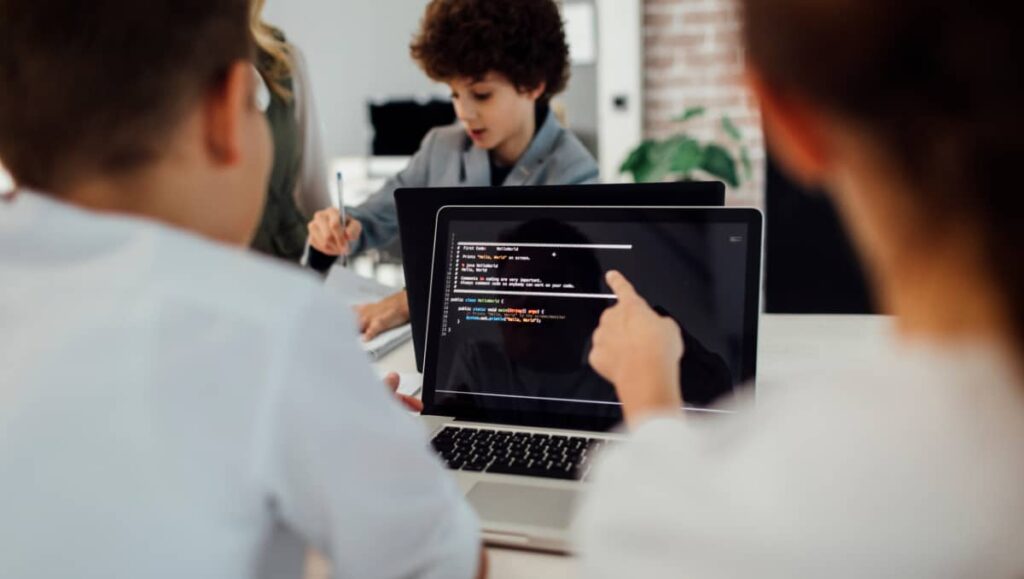In this digital world, the importance of coding is in great demand along with traditional courses like physics, math, and language arts. Coding is no longer just for computer aficionados; it is increasingly recognized as a vital part of contemporary education, providing students with the tools they need to think critically, solve problems creatively, and innovate. As technology continues to influence every aspect of our lives, coding empowers students to not only understand the technology around them but to actively participate in shaping it.
At SGIS School, we emphasize the importance of coding as more than just writing computer code. It is an effective instrument that aids pupils in acquiring critical abilities required in the 21st century. By learning coding, students gain a deeper understanding of technology, improve their problem-solving skills, and open doors to endless opportunities. In a world where technology affects everything from healthcare to entertainment, coding gives students the confidence and skills to be a part of that change.
Additionally, coding teaches important soft skills like collaboration, perseverance, and attention to detail. In the modern world, where success depends on flexibility and innovative thinking, these abilities are extremely important. Whether students are creating a website, an app, or automating a process, they are gaining skills that are applicable to nearly every career.
In this blog, we’ll explore the Importance of Coding in education, how it can be added to school programs, and the positive impact it has on students’ future careers. We’ll show how learning to code helps students prepare for the digital age, making them creators of technology instead of just users.
Why Coding Matters for Students: Building Essential Future Skills
Why is Coding Important for Students?
1. Coding Boosts Problem-Solving Skills
Coding teaches students how to break down complicated problems into smaller, more manageable ones, which helps them build excellent problem-solving skills. This method enables pupils to examine issues from several perspectives and demands critical thinking. As they face obstacles or errors, they learn to troubleshoot, test different solutions, and refine their approach. This problem-solving mindset extends beyond coding and is useful in many areas of life, from academics to real-world situations.
2. Coding Improves Computational Thinking
The capacity to solve issues by decomposing them into smaller and easier ways is known as computational thinking. Students gain the ability to break down difficult issues, see patterns, and develop algorithms to solve them through code. Students that possess this ability are better able to reason logically and critically, which helps in their decision-making. Computational thinking lays the foundation for tackling challenges in many fields, not just technology.
3. Coding Encourages Persistence
Coding can be frustrating at times, especially when encountering errors or bugs. However, this challenge teaches students the importance of persistence. They learn to approach problems with patience and determination, continually testing and refining their solutions. By overcoming obstacles, students develop resilience, a strong work ethic, and a growth mindset—skills that will serve them well in every aspect of their lives.
4. Coding Teaches Creativity
Coding is a creative activity as well as a process of logic and structured procedure. This allows students to put their ideas to life by making websites, creating games, and developing apps. This creative outlet encourages them to look beyond their comfort zone and try out alternative ideas. Coding fosters innovation and allows students to express their imagination while developing practical, functional products.
5. Coding Helps Teach Digital Literacy
It’s essential to know how technology functions in modern times. Learning to code helps students grasp the fundamentals of digital systems, how they function, and how they can be used responsibly. Coding enhances digital literacy, enabling students to interact with technology effectively and evaluate digital information critically. As a result, students become more informed digital citizens, able to navigate the online world with confidence and responsibility.
6. Coding is a Career-Building Skill
Coding is one of the most in-demand skills across a wide range of industries, including software development, data science, artificial intelligence, and web design. By learning to code, students open doors to numerous career opportunities that offer competitive salaries and long-term job stability. As technology continues to grow and evolve, the need for skilled coders will only increase, making coding a valuable skill for future job markets.
7. Coding Improves Confidence and Communication Skills
As students develop their coding skills, they gain a sense of accomplishment from solving problems and completing projects. This boosts their confidence and motivates them to take on new tasks. Additionally, when students collaborate with others on coding projects, they improve their communication and teamwork skills. They learn to articulate their ideas clearly, listen to feedback, and work together to achieve a common objective and skills that are valuable in any professional setting

How Can Schools Incorporate Coding into the Curriculum?
- Early Introduction – The first step in integrating the importance of coding into education is by introducing coding concepts at an early age. Start with simple block-based coding platforms that may be used to teach fundamental programming principles in an enjoyable and engaging manner.
- Integrated Learning – Coding may be applied into many areas, including science, mathematics, and language arts. For example, students can create data visualizations in math or write interactive stories in language arts. This makes learning more relevant and interesting for students and helps them see everyday usage of coding.
- Coding Clubs and Extracurricular Activities – Students may learn about coding outside of the classroom through coding clubs and extracurricular activities. These programs can cover a range of interests and ability levels which enable students to follow their passions and study at their own speed.
- Coding Competitions and Challenges – Participating in coding competitions and challenges can motivate students, boost their confidence, and expose them to real-world coding applications. These activities give an opportunity for students to show their abilities, gain knowledge from others and develop a desire to grow.

Looking Toward the Future – Coding as a Core Skill
Coding is now much more than just a computer science skill because it helps students to develop important life skills like problem-solving, creativity, and teamwork. By including coding in school programs, teachers can help students think critically, find solutions, and work together effectively. These skills are key to preparing students for careers in a world where technology is everywhere. As technology continues to grow, students who know how to code will be ready to understand and shape the future.
At SGIS School, we recognize that coding is not just about learning a technical skill, but about equipping our students with the tools they need to thrive in a digital world. By prioritizing the importance of coding in education, we ensure our students have the skills to face the challenges and opportunities that technology presents. SGIS is committed to providing a learning environment where every student has the chance to build the skills they need to succeed and innovate in the future.
Also read – Character Education: Building Responsible Students








[…] Also read: The Importance of Coding for Students in Schools – Building Future Skills […]
[…] Also read – Impact of Extracurricular Activities on Student Growth […]